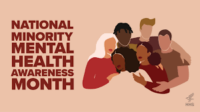

Why is mental health awareness foundational for diverse communities?
By: Karen Mancera-Cuevas, DrPH, MPH, Senior Director, Health Equity
Mental health impacts a variety of aspects of our growing representative landscape in the United States. This intersectional experience represents everything from seeking timely services to care (social service, community-based organizations, mental health centers) to tapping into support systems (family, friends, religious leaders) to training and relying on public servants to serve as first responders in situations of mental health crisis (emergency medical services, police, and firefighters).
According to the U.S. Department of Health and Human Services, Office of Minority Health, mental health includes our emotional, psychological, and social well-being. It affects how we think, feel, and act, and helps how we determine stress, relate to others, and make choices.1 Access to adequate mental health services has caused timely debates on the topic. Intersecting such issues are the appropriate navigation of counseling and social work providers in behavioral health systems. Foundational access challenges — such as lack of health insurance coverage or cost — are added barriers for many people from historically underrepresented racial and ethnic (HURE) groups.2
There is often stigma facing individual’s representative of diverse communities. Finding the courage to seek mental health treatment for many is the first step but due to cultural barriers, individuals may feel discouraged, unsupported, or misunderstood for their intent in seeking care.
In 2021, only 39% of Black/African American, 25% of Asian, and 36% of Latino/Hispanic adults with mental health illness were treated, in comparison to 52% of non-Hispanic white adults.3 Representative groups may encounter racial/ethnic discrimination or discriminatory practices in places of employment, which can cause stress and racial trauma.4
Such viewpoints often stem from a lack of awareness or knowledge on the complexity of mental health and how it impacts quality of life, work performance, and social connectedness. Lack of employment may also lead to poverty, limiting access to mental health care and causing additional stress to impacted individuals.5
During the COVID-19 pandemic, health disparities further exacerbated mental health related challenges for many facing uncertainty, despair, lack of adequate housing, hunger, and unemployment due to an unstable economy. Particularly, certain HURE communities were devastated.
In 2020, suicide was the leading cause of death amongst Asians and Pacific Islanders under the age of 19 and the second leading cause of death in the 20- to 34-year-old age group.6 It may be challenging to find providers from one’s racial/ethnic group who are aware of culturally congruent care and integration of social support systems within this context.7 Much more is needed to support diverse communities through access to community based mental health services.
Mental health specific culturally resonant organizations, such as Mental Health America, annually provides an informative toolkit targeting Black, Indigenous, and People of Color (BIPOC) communities. For more information, and to download this free resource from our National Health Council member organization, go to BIPOC Mental Health Month | Mental Health America.
References
- Department of Health and Human Services, Office of Minority Health, National Minority Mental Health Awareness Month, National Minority Mental Health Awareness Month — Home (hhs.gov). Accessed July 18, 2023.
- Department of Health and Human Services, Healthy People 2030: Healthcare Access and Quality, Health Care Access and Quality – Healthy People 2030 | health.gov. Accessed July 20, 2023.
- Department of Health and Human Services, Substance Abuse and Mental Health Services Administration, 2021 National Survey on Drug Use and Health, Section 6 PE Tables – Results from the 2021 National Survey on Drug Use and Health: Detailed Tables, SAMHSA, CBHSQ. Accessed July 20, 2023.
- Department of Veterans Affairs, PTSD: National Center for PTSD. Racial Trauma – PTSD: National Center for PTSD (va.gov). Accessed July 20, 2023.
- Department of Health and Human Services, Substance Abuse and Mental Health Services, CBHSQ Report, Serious Mental Illness Among Adults Below the Poverty Line (samhsa.gov), Accessed July 20, 2023.
- Department of Health and Human Services, Substance Abuse and Mental Health Services Administration, 2021 National Survey on Drug Use and Health, Asian American, Native Hawaiian, and Pacific Islander (AA and NHPI) | SAMHSA. Accessed July 20, 2023.
- American Psychiatric Association, Mental Health Disparities: Diverse Populations, org – Mental Health Disparities: Diverse Populations. Accessed July 20, 2023.


